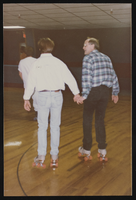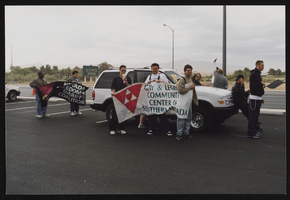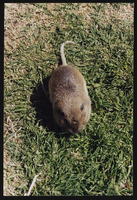Search the Special Collections and Archives Portal
Search Results
Mary Hawkins oral history interview
Identifier
Abstract
Oral history interview with Mary Hawkins conducted by Bill Murphy on June 22, 1972 for the Ralph Roske Oral History Project on Early Las Vegas. In her interview Hawkins discusses her reasons for moving to Las Vegas, Nevada and the developmental changes she has seen occur in Las Vegas.
Archival Collection

Gay Skate Night at the Crystal Palace in Las Vegas, Nevada: photographic prints
Date
Archival Collection
Description
Image

Gay and Lesbian Community Center of Southern Nevada and the Nevada Freedom to Marry Coalition at the second annual Gay Pride parade: photographic print
Date
Archival Collection
Description
Image
Archives, 1961-1971
Level of Description
Archival Collection
Collection Name: Las Vegas Library Regional History Files Collection
Box/Folder: Box 01
Archival Component
J. K. Russ oral history interview
Identifier
Abstract
Oral history interview with J. K. Russ conducted by Claytee D. White on December 22, 2017 for the Remembering 1 October Oral History Project. In this interview, Russ discusses her early life in New Zealand and growing up on a tobacco farm. She remembers arriving to the United States and establishing a career as an artist. Russ talks about the 1 October shooting, creating an art exhibit using cards and letters received from people all over the world, and Las Vegas’ response to the tragedy. Lastly, Russ describes the art community in Las Vegas and the Arts District.
Archival Collection
Ruth Poirier oral history interview
Identifier
Abstract
Oral history interview with Ruth Poirier conducted by Joanne Goodwin on February 05, 2003 for the Women's Research Institute of Nevada (WRIN) Las Vegas Women Oral History Project. Poirier opens her interview by discussing her partner Doris Pressler, who had passed away before the interview. She describes Doris' upbringing, her role in the first band at the Roseland Ballroom in New York, and explains how an all-women band in the 1930s and 1940s was a phenomenon. Poirier then discusses her own history, including how she became involved in music and all-women bands, and how she met Doris. Poirier describes in detail the importance of music to her family, the types of music she played, and what it was like to be a musician during the Depression. She talks about her relationship with Doris and recalls early interactions with other gay youths. Poirer ends her interview explaining why she and Doris decided to settle in Las Vegas, Nevada, and describes their impressions and involvement with the local LGBTQ+ community.
Archival Collection
Archived websites
Level of Description
Archival Collection
Collection Name: UNLV December 6, 2023 Memorial Collection
Box/Folder: N/A
Archival Component

Ground squirrel at Gay Pride: photographic print
Date
Archival Collection
Description
Ground squirrel at Gay Pride at Sunset Park, 1999. Photographer: Dennis McBride. (5-8-99).
Image
Archives, 1986
Level of Description
Archival Collection
Collection Name: International Food Service Executives Association Records
Box/Folder: Box 078 (Restrictions apply)
Archival Component
Archives, 1983
Level of Description
Archival Collection
Collection Name: University of Nevada, Las Vegas Office of Vice President for Academic Affairs Records
Box/Folder: Box 079
Archival Component
